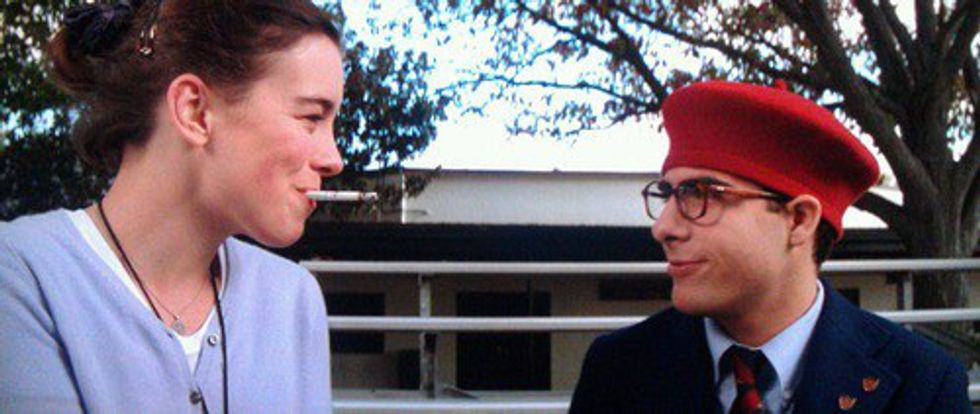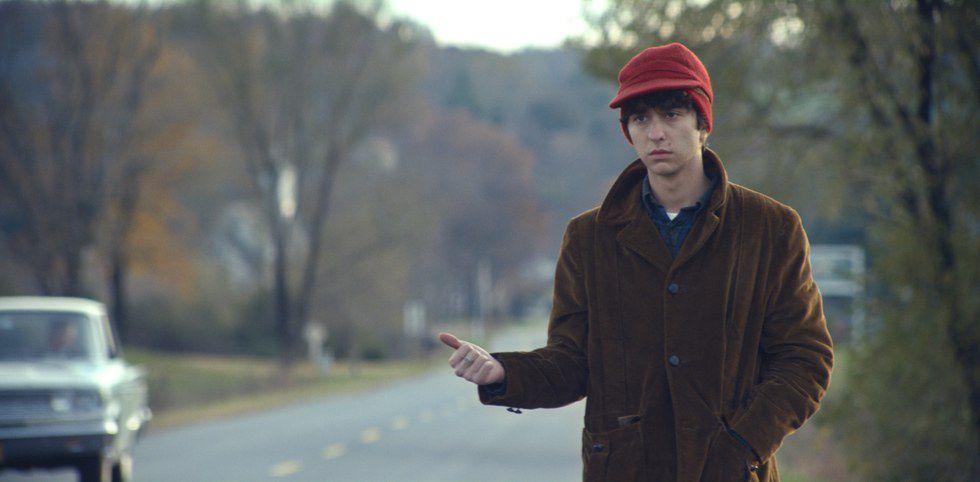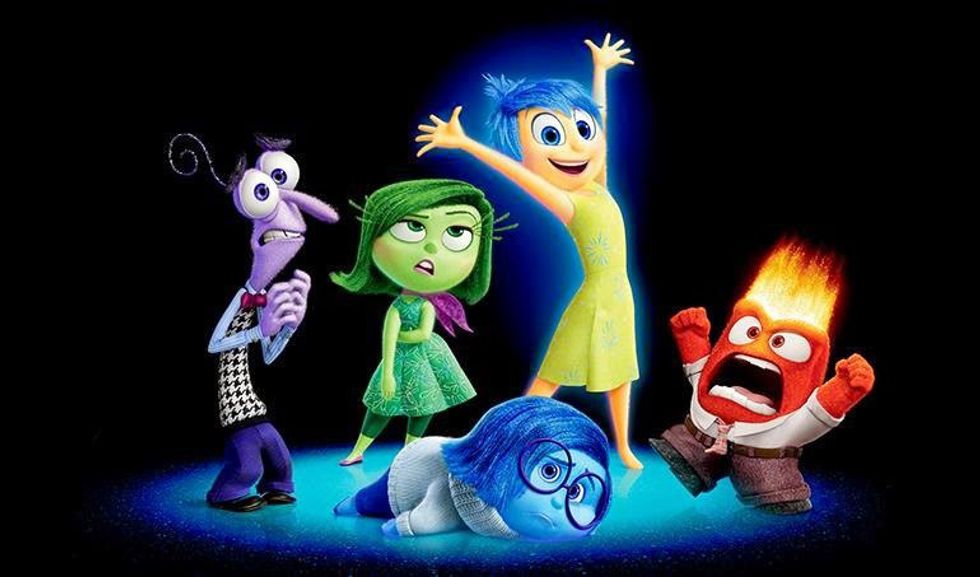I adore the film Rushmore, Wes Anderson's breakout 1998 coming-of-age story starring Jason Schwartzman, Bill Murray, and Olivia Williams. In short, it's about a student at the prestigious Rushmore Academy, 15-year-old Max Fischer (played by Schwartzman), who falls in love with Miss Cross (played by Williams), a teacher at Rushmore's elementary school. The scene where Cross and Fischer meet, in particular, is a memorable one. For one, to see these beloved characters meet is enough, but one particular stretch of dialogue has always resonated with me:
Max: "They're gonna cancel Latin. They've got to make room for Japanese."
Miss Cross: "Really? That's too bad. All the Romance languages come from Latin."
Max: "They do, don't they. Like French, probably."
She nods and smiles.
Miss Cross: "Nihilo sanctum estne?"
Max: "That's Latin, isn't it?"
Miss Cross: "Yeah."
Max: "What does it mean?"
Miss Cross: "Is nothing sacred?"
In the 21st century, we need to ask "Nihilo sanctum estne?" more often, especially when it comes to book adaptations. It's no secret that books get adapted to films; some of the classic films, way before our time, were adapted from books; Gone With the Wind is a great example. The main difference between 1939 and 2015, though, is that people actually read novels in 1939. Research from Common Sense Media found that in 1984, 8% of 13-year-olds and 9% of 17-year-olds said they “never” or “hardly ever” read for pleasure. In 2014, that number had almost tripled, to 22% and 27%.
Yes, the kids are reading less. And film adaptations are making matters worse.
One can make an argument that these adaptations get people to read more. At work, I sometimes see coworkers reading and the books are typically ones that were adapted to films or are yet to be. It's a nice way for one to find out what happens in the movie before the movie is released. But are we becoming too dependent of the movie? Like the book is just a script and nothing more?
Connecting with someone that has read the same book as me is very special because books are not only lesser read, but the choices are so diverse that it's rare for someone to have shared that experience as me. And reading really is a sacred experience. It's a private thing to do, for one. I can't think of many other recreational activities where a person is alone with no sound. So when I get to discuss all of that private dedication with someone, it's enlightening. But what ruins it is when someone jumps into the conversation about it, providing full comprehension and when I ask them if they've indeed read the book, they go "No, but I saw the movie." It seems like such a cheap way out. For a person to take two weeks to get through a story and be on the same comprehension field as a person that takes two hours is like a person who studies hard on a test receives the same grade as someone who cheated on it.
The reverse effect can happen, though. If one could read the book in preparation of the film adaptation, one can easily not want to read the book. It's like when someone doesn't go to the movie theater to watch a movie. The common expression: "I'll just wait until it comes out on DVD." It'll get to a point that people will just know that a book will be adapted just because it's popular and end up not reading it.
Not only on a social level but on a personal level as well, the film adaptation ruins the book in a way. Reading a book, the whole story occurs in the reader's mind. All of the characters, the settings, everything is conjured in the mind of the beholder. And maybe 100 people read that book or maybe 1,000,000 people read that book, but no two people read it in the same way. Nobody shared the same experience. And, most importantly, no one told that reader how the book was presented. The author gave the dialogue and the description, but it was up to the reader to interpret that anyway he or she pleases. When the film is released, though, those characters and the settings are no longer the individual's creation; they become Hollywood B-list actors and a studio in Hollywood, even if the story takes place in New York City. And everyone who has seen the movie was given everything, not coming up with anything on their own. That idea is forever gone. Even if the person were to go back and read the book again, the imaginative projection of the story is clouded by how it turned up on screen.
One aspect of the grandeur of J.D. Salinger's literary classic The Catcher in the Rye is that it has never been adapted into a film. Salinger was famous for his disdain towards film, presented explicitly through Rye's protagonist Holden Caufield: "If there’s one thing I hate, it’s the movies. Don’t even mention them to me." Not too subtle. Joking aside, it's interesting and cool to call The Catcher in the Rye a book primarily, not a film. Unfortunately, that might change soon. Salinger died in 2010, giving up the rights to the story to his family; he wrote before his death "It is possible that one day the rights will be sold. There's an ever-looming possibility that I won't die rich. I toy very seriously with the idea of leaving the unsold rights to my wife and daughter as a kind of insurance policy." Anything is possible; the rights might even be sold by the end of the decade.
In a way, Catcher is already becoming a film. Coming Through the Rye, a 2015 independent film directed and co-written by James Steven Sadwith, is about a teenager in 1969 named Jamie Schwartz (played by Alex Wolff), who is obsessed with the protagonist Holden and runs away from boarding school to find Salinger. The film played in the Austin Film Festival on November 4th and no news for a wide theater release has been given.
Although I'm excited for this film, it's yet another sign of the unoriginality in film today. Though this occurs more in Hollywood than in the Indie scene, to have a movie be about not being able to be unoriginal in adapting a book is semi-ridiculous, segueing to my next argument. Not adapting as many books encourage studios to come out with original content, something that Hollywood should really start focusing on; it's gotten out of hand.
According to boxofficemojo.com, the top 10 grossing films of 2015 as of November 10, 2015, are as follows from highest to lowest grossing: Jurassic World, Avengers: Age of Ultron, Inside Out, Furious 7, Minions, Cinderella (2015), The Martian, Mission Impossible: Rogue Nation, Pitch Perfect 2, and Ant-Man. The only original film on that list is Inside Out.
I think I reason why this film was so successful was the cinematic quality of it. It would be hard to juggle so many characters personified in a person's emotions and revert to the outside of a mind in a novel. Inside Out is just one of those rare films we see today that shows why film is important and how it isn't necessarily better or worse than literature but it's own art form entirely.
"Raised on TV' is a common term. What it means, in a nutshell, is that adults went through childhood learning their values and receiving their entertainment through television. In one way, it's a critique on parenting and how instead of teaching their kids morals themselves, television is relied upon to do it. Another interpretation, though, is that television has replaced literature as childrens' main form of entertainment, which is something relevant as ever today. Film, as well, is replacing the novel. And because children are reading less, their vocabulary is narrowed, and their literary prowess is stunted. But there still have to be writers, though, so today's writers are ones that were "raised on TV" and subsequently have a writing style that is fit to the screen. Through the YA fiction I've read, I've found a simplicity to the stories given, a few examples being the works of John Green and essentially any dystopian story. This simplicity is shown through a traditionally linear mode of storytelling, first-person limited narrative that are consistent to one character throughout, and a rather skeletal internal monologue. These components make these novels (or as I like to call "glorified screenplays") even easier to adapt to screen. So while films are losing their cinematic quality, novels are also losing their literary quality, providing this muddled, hermaphroditic gray area.
I don't believe all books shouldn't be adapted into films, though. The Godfather was a trashy mafia book before it became arguably the greatest film of all time. Other books are great but don't get the exposure until the movie adaptation really gets it shown through. But there are just so many that are done simply for the black-and-white thought process of "this was a good book; let's make it a good movie."
When a book is at an unadapted state, there is this nice, secret quality to it; one has to read it to know what happens...until that book does get adapted. So I ask: nihilo sanctum estne?
























